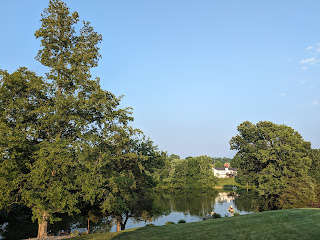 |
| Pictured: Kentucky |
I want to talk about home. Actually, I want you to
understand what I felt in a very specific moment, and the concept of “home” is
key to that moment.
The moment: I am sitting on a deck in Kentucky. It is
morning. The birds are making a charming ruckus in the trees. The water on the small
lake is shimmering, the sun bouncing off the waves caused by the light breeze. I
have a mug of coffee in my hand. I am a guest in the house, but I do not feel
like one. I feel at home.
“Home” is a strange feeling for me. My dad was an itinerant
preacher for many years. As a result, I grew up moving relatively often, and the
idea of a building being home didn’t carry much emotional weight for me. Home was
where the family was. Mom + dad + brothers + sister = home. That was a simple definition,
and it helped reduce the boat-adrift-at-sea feeling that came with moving.
Eventually, my dad retired from preaching, and we settled into
our own house. I spent three years of high school in that town, and a building
finally felt like home. It was where my family gathered so often that the feeling
of family was there even when my family wasn’t there. Even after I left for
college, I belonged there and was welcome there without question. I’m struggling
with getting the feeling across here. Let’s try this. Home is like the promise
of a hug from your dad or your mom. It doesn’t matter if that hug is to console
you from a breakup or to celebrate acing a test or just to say hello. It is the
expectation of warmth and love.
The apartment I had in college was just a place to live and
eat and drink too much Pepsi with my friends. It was nice, but it was always
temporary. It lacked the permanence of home. The apartments I lived in after
graduating from college were good and made better by good roommates. But they,
too, lacked the rooted feeling of home. Years passed. I got married. We bought
a house. And eventually (although not immediately), that house stopped being a place
I lived and started being home. On good days or bad days, someone I loved was
waiting there or would come there if I waited long enough.
Which brings us to Kentucky. Family from across the country came
to a small town to celebrate the 90th birthday of my wife’s grandma.
We gathered at grandma’s house.1 It was the hub, the axis upon which
the activities of the week spun. The house is in a quiet neighborhood that
rings a small lake. During the week we spent in Kentucky, the house was full of
aunts and uncles and cousins and nephews and nieces and grandsons and granddaughters
and great grandsons and great granddaughters and I-think-that’s-it-but-if-it-isn’t-you-get-the-idea.
It was full of family. I’ve known some of the people for years. Some of them I met
for the first time that week.
We fished off the dock and learned how to pan fry bluegill. We
drank wine and discussed politics (on which there was a wide variety of opinions).
We played Trivial Pursuit™ at midnight. We chased kids around the house, played
pool, played ping pong, laughed, hugged, and told stories. We were a group of
people from the far corners of the country. We represented a wide range of political
and religious views. And we were, all of us, bound together by the simple fact
that by birth or by marriage, we are family.
It was during this week that I had my moment sitting on the porch drinking coffee. It was the epiphany that I am always welcome in grandma’s house. That I am a part of that family, and the house that held so many of us that week was, in some small way, home to a part of me.
1I’m going to call it “grandma’s house” for
linguistic simplicity. It is, and always has been, home to multiple
generations. It could probably more accurately be called “grandma and uncle and
aunt’s house” but I think we can all agree that’s too much of a mouthful.
Comments